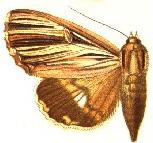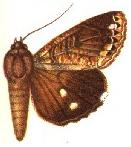
Spilomelinae is a very species-rich subfamily of the lepidopteran family Crambidae, the crambid snout moths. With 4,135 described species in 344 genera worldwide, it is the most speciose group among pyraloids.

Omiodes is a moth genus in the family Crambidae. Several species are endemic to Hawaii.

Erebus is a genus of moths in the family Erebidae.

Crocidophora is a genus of moths of the family Crambidae. The genus was erected by Julius Lederer in 1863.

Herpetogramma is a genus of moths in the family Crambidae described by Julius Lederer in 1863. It currently comprises 106 species that are found in North America, Eurasia, Australia, New Zealand, Central and South America. Of the few species where host plants are known, the larvae mostly feed on grasses.

Syllepte is a genus of moths in the family Crambidae.

Ercheia is a genus of moths in the family Erebidae. The genus was erected by Francis Walker in 1858.

Asota is a genus of moths in the family Erebidae first described by Jacob Hübner in 1819. Species are widely distributed throughout Africa, India, Sri Lanka, Myanmar, the Malayan region and tropical parts of the Australian region.

Chrysocraspeda is a genus of moths in the family Geometridae described by Charles Swinhoe in 1893.

Ercheia ekeikei is a species of moth of the family Erebidae. It is found in New Guinea as well as Queensland.

Ercheia multilinea is a species of moth of the family Erebidae. It is found in Sundaland, the Philippines, Sulawesi and Seram. The species is infrequent in forest from the lowlands to 1790m, but is perhaps more often encountered above 1000m.
Ercheia kebea is a species of moth of the family Erebidae. It is found in Thailand, Sumatra, Borneo, Seram, New Guinea, Queensland, east to Fiji.

Ercheia cyllaria is a species of moth of the family Erebidae first described by Pieter Cramer in 1779. It is found in the Indian subregion, Sri Lanka, Taiwan, Japan, Indochina, Thailand, Peninsular Malaysia, Sumatra, Borneo, Seram and the Kai Islands.

Ercheia pulchrivena is a species of moth of the family Erebidae first described by Francis Walker in 1864. It is found on Sumatra and Borneo.

Lepidoptera Indica was a 10 volume work on the butterflies of the Indian region that was begun in 1890 and completed in 1913. It was published by Lovell Reeve and Co. of London. It has been considered the magnum opus of its author, Frederic Moore, assistant curator at the museum of the East India Company. Frederic Moore described a number of new species through this publication. Moore was a splitter, known for careless creation of synonyms, sometimes placing the same species in more than one genus.
Ercheia subsignata is a species of moth of the family Erebidae. It is found in the Republic of Congo, the Democratic Republic of Congo, Ethiopia, Gabon, Ghana, Kenya, Malawi, Nigeria, Sierra Leone and São Tomé & Principe.
Ercheia careona is a species of moth of the family Erebidae first described by Charles Swinhoe in 1918. It is found in Indonesia, where it has been recorded from Kaloa Island near Sulawesi.

Margaroniini is a tribe of the species-rich subfamily Spilomelinae in the pyraloid moth family Crambidae. The tribe was erected by Charles Swinhoe and Everard Charles Cotes in 1889, originally as family Margaronidae.











